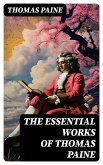In "The Political Works of Daniel Defoe," the author unearths the intricate interplay between politics and society through a series of provocative essays and pamphlets. Defoe's literary style, marked by clarity and wit, encapsulates the tumultuous political landscape of early 18th-century England, characterized by a rise in governmental scrutiny and burgeoning civil liberties. His works, including seminal pieces like "The Review" and "The Shortest Way with Dissenters," reveal an astute engagement with contemporary issues such as religious tolerance, the nature of power, and the nuances of public opinion. By contextualizing these writings, Defoe positions himself as a pioneering voice in the discourse of political thought, transcending mere literary craft to influence political ideology itself. Daniel Defoe, a merchant turned writer, lived through the turbulent times of the English Civil War and the Glorious Revolution, which profoundly shaped his perspectives on governance and society. His diverse experiences, including imprisonment for seditious libel and a life as a pamphleteer, endowed him with unique insights into the intersection of private life and public duty. Through his multifaceted career, Defoe channelled his frustrations and hopes into his writings, advocating for an engaged and informed citizenry amid political chaos. This anthology is essential for readers seeking to understand the foundations of modern political discourse and the evolution of public opinion. Defoe's works remain remarkably relevant, offering timeless reflections on freedom, authority, and individual responsibility. Engaging with this collection invites readers to connect the past with current political dilemmas, enriching their understanding of both literature and history.
Dieser Download kann aus rechtlichen Gründen nur mit Rechnungsadresse in A, B, BG, CY, CZ, D, DK, EW, E, FIN, F, GR, H, IRL, I, LT, L, LR, M, NL, PL, P, R, S, SLO, SK ausgeliefert werden.









